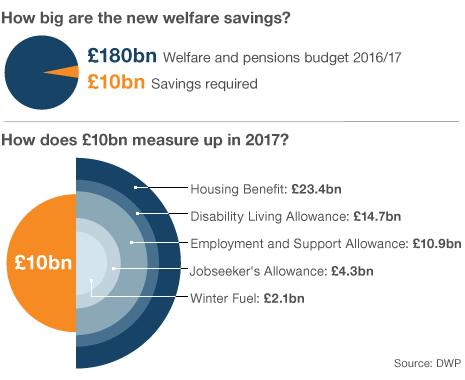Tory conference: George Osborne in £10bn benefit cut vow
- Published
- comments
George Osborne on tax rates 'for the very richest', the 50p tax rate and cap on benefits
The government is determined to cut a further £10bn from the benefits budget to fight the deficit, Chancellor George Osborne has told the Tory conference.
One idea he suggested was limiting the number of children in a family that should be supported on benefits.
He said the better-off would pay more in taxes, but the budget could not be balanced "on the wallets of the rich".
He also unveiled a plan for workers to give up a string of employment rights in return for shares in their employer.
The new owner-employee contract allows owners to award shares worth up to £50,000 to their staff, in return for the employee giving up their unfair dismissal, redundancy and training rights and also the right to ask for flexible working.
He said there would be no capital gains tax on the profits from the shares, so it would be "owners, workers and the taxman all in it together".
Mr Osborne's speech comes with the UK economy in recession, hitting the government's tax takings and its plans to reduce the deficit (the difference between the amount spent by government and the amount it receives from tax etc).
In his speech in Birmingham, the chancellor made clear he was not planning to change course and said a further £16bn of savings must be found by 2015/16 to meet his target of balancing the budget within five years.
This, he said, would include cutting £10bn more from the welfare bill by 2016-17, on top of the £18bn announced in 2010.
Mr Osborne said: "Let the message from this conference be clear: we will finish the job we have started."
'Large bill'
He told party members that "the economy is healing" but added that "healing is taking longer than we hoped, because the damage was greater than we feared".
Mr Osborne spelt out ideas for cutting the welfare bill, such as limiting housing benefit for the under-25s, so that young people without a job have to live at home; possible further curbs on child tax credits; and allowing benefit increases to be lower than the rate of inflation.

Deputy Prime Minister Nick Clegg told his own party's conference last month that he would not allow "wild suggestions" of a £10bn cut in welfare and Chief Secretary to the Treasury Danny Alexander told delegates: "We simply will not allow the books to be balanced in a way that hits the poorest hardest."
The Lib Dems advocate a "mansion tax", under which owners of homes worth more than £2m would pay a 1% annual charge on property values above that level.
Mr Osborne ruled out such a measure, which is unpopular among Conservative MPs, saying: "It would be sold as a mansion tax, but once the tax inspector has been let in the door, we would soon find most homes in the country incur a mansion tax.
"It's not a mansion tax but a homes tax, and this party of homeowners will have no truck with it."
But he said taxes for the most well-off would be increased in some form in the next few years, so that those "with the broadest shoulders" paid most.
However, he said: "Just as we should never balance the budget on the backs of the poor, it's a delusion to say we can balance it on the wallets of the rich."
Universities money
BBC political editor Nick Robinson said the comments by Mr Osborne and senior Lib Dems amounted to "haggling in public" over the size of tax rises and welfare cuts.
Mr Osborne presented a united front with Work and Pensions Secretary Iain Duncan Smith, following reports the Treasury wanted to scrap the work and pensions secretary's new Universal Credit over fears costs and complexity were spiralling out of control.
Mr Duncan Smith is understood to have initially resisted the welfare cuts proposal, arguing savings should be found by means-testing benefits such as free bus passes and winter fuel payments for better-off pensioners.
In his speech, Mr Osborne accused Ed Miliband of lacking an alternative economy strategy, claiming the Labour leader did not mention the budget deficit once in his Labour conference speech last week.
He also announced an extra £200m in government funding for scientific research in English universities and restated his belief in the future possibilities of shale gas.
The Research Partnership Investment Fund was launched with £100m of government funding by Mr Osborne in his March Budget.
Universities must match any public money with at least double the amount of cash from the private sector or charities, which the government claims could add up to a total investment in research of more than £1bn.
The Conservatives began their annual conference with policy announcements aimed at easing the cost of living as they attempt to show they are on the side of hard-pressed families.
These include extending the council tax freeze in England for the third year in a succession and capping some rail fare increases to inflation plus 1%.
David Cameron also said he would be prepared to veto a new EU budget to prevent "massive" increases.